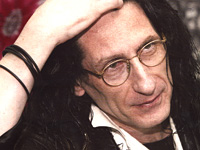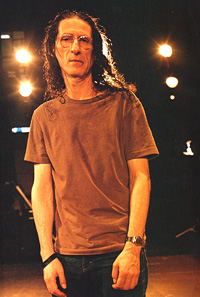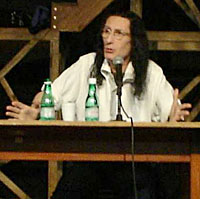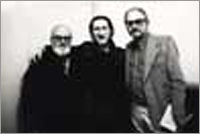 |

BIOGRAPHY
Born in 1954,Gerald Thomas has spent his life between the United States, England, Brazil and Germany, graduating as a reader of Philosophy at the British Museum Reading Room and "officially" beginning his life in the theater at La MaMa Experimental Theater (but having received early on in life a great inspiration by watching the rehearsals of Victor Garcia's masterpiece staging of Genet's Balcony in Sao Paulo in the seventies. A year later, at the Aldwich in London, Thomas was able to become an 'intruder' in Peter Brook's rehearsals of the RSC in the Midsummer Night's Dream. Back in the US, at La MaMa, Thomas became an illustrator for the Op-Ed page of the New York Times while also conducting workshops at La MaMa, where he adapted and directed a few world premiere Samuel Beckett prose and dramatic pieces.
In the early eighties, Thomas began working with Beckett, the man himself, in Paris (after a lot of correspondence had been exchanged between them for almost two years), adapting new fiction by the author. Of these, the more notorious were "All Strange Away" and "That Time" staring the legendary Living Theater founder, Julian Beck in his only stage acting role outside of his own company, The Living Theater.
In the mid-eighties, Thomas became involved with German author Heiner Müller, directing his works in the US and in Brazil, and began a long term - and highly questionable partnership with American composer Philip Glass.
In 1985 Thomas formed and established his Dry Opera Company, in São Paulo, Brazil.It has, since, performed in 15 countries with yearly returns. With the Dry Opera Company, Thomas has written and directed Eletra Com Creta, The Kafka Trilogy, Carmem Com Filtro, Mattogrosso, The Flash and Crash Days, The Trilogy of the B.E.A.S.T. and M.O.R.T.E,Nowhere Man, Os Reis do Ie Ie Ie (A Hard Day's Night), The Ventriloquist, Nietzsche Contra Wagner, Waiting for Beckett, UnGlauber, The Prince of Copacabana, The Empire of Half Truths, Deus Ex Machina, Terra em Transito, Ashes in the Freezer, A Cube of Ice in Flames and a Tribute to Beckett's 100's anniversary, Asfaltaram o Beijo (Asphalt over a kiss). The Company has performed worldwide at several prestigious venues, such as Lincoln Center in New York, Denmark's on and off off theaters, The Munich State Theater, Vienna's Wiener Festwochen, The Taormina Festival, Zagreb and so many others. Most of the productions were televised by the national networks of the respective countries (please view full list of dates and venues under "Whereabouts".)
In 1987, Thomas directed his first opera, Wagner's "The Flying Dutchman" at Rio de Janeiro's Opera House. Brazil had never seen such an effervescent uproar. Public and critics alike were divided into profound love and hatred over Thomas' unconventional staging. Discussions over Thomas' placement of the story at the Berlin Wall occupied entire pages of newspapers and hour-long television debates, for months.The last performance was televised live to Germany and later broadcast in 5 different countries.
What followed was a complete turn of events in Thomas' life. Soon he completed a new work with Philip Glass, "Mattogrosso", and accepted invitations to work with international companies at several European opera and theater companies. In 1990, Thomas wrote and directed his own "Sturmspiel" for the Cuvlliés; Theater, with the Munich State Company and premiered "Perseus and Andromeda", by Salvatore Sciarrino, at the Stuttgart State Opera. Also in 1991, Thomas wrote and directed "The Said Eyes of Karlheinz Öhl" for the Pontedera Theatre Company,the home of Jerzy Grotowski in Italy, and re-staged Beckett's "Waiting for Godot" for the Munich State Theater.
In January of 1996, Thomas premiered a new work in Copenhagen, "Chief Butterknife, and the haunting spirit of his archenemy, kryptodick"with the Danish theater company Dr. Dante's Aveny. His Dry Opera Company was back in Copenhagen in September 96, premiering a new work,"Battleship Faust".
The Schwetzingen Festpiele, curated by Klaus Peter Kehr, together with Mannheim's Deutsches National Theater invited Thomas to direct the world premiere of Detlef Heusinger's "Babylon" (a sleeper!!!!). Although the cast was fun to work with, this incredibly pretentious composer was a brat! The production, well.........There was Andy Warhol on stage, as there was Basquiat and other painters....Oh yes, Thomas revived Warhol's version of Marilyn Monroe (in all her colors) but still the production was as dull as the FDR drive.
"Graal, the Portrait of Faust as a Young Man", written in 1952 by the creator of concrete poetry in Brazil, HAROLDO DE CAMPOS (and many times a collaborator of Thomas and curator of the two books on Gerald's work, published by Editora Perspectiva and Jaco Ginsburg), this piece had original music composed by Michelle DiBucci - a great composer from New York City (a constant collaborator of Thomas's work). This piece was staged with Bete Coelho in the role of FAUST and 32 graduating students from CAL (Casa de Arte das Laranjeiras) one of the best Acting Schools in Rio. Amongst the students graduating then, are well known actors and directors who were directly integrated into the Dry Opera Company, such as Camila Morgado, Bruce Gomlewski and Ivan Sugahara. This took place at Theatro Carlos Gomes in late 1997.
In 1998, Thomas directed his most ambitious project yet: Schönberg's opera "Moses und Aron", at Graz. Thomas set the opera inside a TV studio as if it were one of these cheap talk shows like Jerry Springer where the audiences manifest themselves all the times, shouting, interfering and so on. Gerald Thomas made an inventory of deconstructivism out of this unfinished opera, placing on the stage every icon of the 20th Century art scene (from Duchamp to Pollock, to Koons, Warhol and Helio Oiticica and Christo) on stage. Iconoclasty was also the big issue simply because (for very personal reasons) Thomas believes that the 20th Century has already analyzed all that it had to analyze, destroyed all that it had to destroy, and put under a very acute microscopic lense every broken piece of the mosaic that there possibly was. The French semiologists have done their part. Now, as Karl Loebl put it brilliantly in his live review on the ORF channel live during the curtain call "Gerald Thomas very intelligently staged the consequences of the conflict between the two brothers and everything that can be read in between". The production was hailed as one of the best ever and Nuria Nono Schoenberg herself was there and seemed very moved by what she saw.
1999
Bonn Opera House "RAW WAR" (title by Gerald Thomas) for an opera By Brazilian composer living in Cologne, Paulo Chagas. This fiasco was called a "techno opera" but it might as well had been called - from the beginning - a "fiasco opera".
2000 brings about a revolution: the Dry Opera goes Unplugged.
Also that year, there were many productions in different parts of the world (all listed under "Whereabouts")
Gerald Thomas is the recipient of three Moliere Prizes, and eighteen other awards, and has been the subject of television documentaries for the German network NDR 3, the Brazilian network TV Cultura, USA's public network PBS and Austrian TV, ORF. Three books on Thomas' work are due to be published early next year by Chigago University Press and Perspectiva Publishers, of Brazil. Gerald Thomas writes regularly for the Brazilian newspaper Folha de Sao Paulo and maintains a blog: www.uol.com.br/geraldthomas.
An explanation to the 'mooning case" of Tristan and Isolde in 2003 : Gerald Thomas directed his first TRISTAN UND ISOLDE at the Deutsches National Theater in Weimar with unprecedented success (the 2003 version -in Rio- was extremely controversial: it brought him to the Criminal Justice System because the director mooned the audience (see the New York Times press clipping of 11 November 2003 under "press"). The Weimar production had the extraordinary tenor Hans Aschenbach in the role of Tristan. The two versions of Tristan and Isolde (Weimar and Rio de Janeiro differed entirely: although both took place in an abandoned movie theater that was being developed as a permanent fashion building, the Rio version introduced a "main" or central character around whom all the singers revolved: Sigmund Freud. And that, to the hard core Wagnerians, was...unforgivable.
It was in Freud's office or cabinet that the three acts took place and - therefore - the love potion became a statement of delirium against neurosis and, little by little, the master of psychoanalysis would be seen losing his job. In the last act, Dr Freud is seen being a make up artist in today's fashion industry. "Fashion kills passion". The boos were so loud and the Nazi cries from the audience so outrageous that Thomas could not help but retaliate: he took off his pants (see his frontal nude protest a few pages along from here also under "press")
The Ventriloquist became a media phenomena: due to its cult status and increasing audience, the most important Rio daily and the Brazilian version of Time magazine ran front page articles describing the unprecedented: most theaters in Rio were running at 50% capacity and the Ventriloquist had lines forming outside from noon onwards. The show was in repertory for three years.
2004
"Anchorpectoris" subtitled the United States of the Mind will open at La MaMa on March 6th, almost 20 years to the date of the premiere of All Strange Away,
2005
"Um Circo de Rins e Figados" or, a Circus of Kidneys and Livers has simply been a phenomenal and unprecedented success in Gerald's career, critically as well as with the audience. Since it has opened, on April 30th, it has been seen by moore than 80 000 people across Brazil and Argentina. It's a political comedy with Marco Nanini in the title role (it was written specifically for this magnificent actor) and the play will continue to tour.
2006
FOUR new productions opened on March 27 in Sao Paulo under one common title: Asfaltaram a Terra - The Earth has been Asphalted). These four productions will run in repertory and can be seen every weekend, as of the end of March, in Sao Paulo, across Brazil and at La MaMa in Dec 06
-"Brasas no Congelador" (Ashes in the Freezer) has introduced TV talk show host Sergio Groisman to the theater.
-"Um Bloco de Gelo em Chamas" (A Cube of Ice in Flames) was written for actor Luiz Damasceno and company.
-"Terra em Transito" - a solo for Fabiana Gugli (performing with a swan- Juliano Antunes) shows a diva trapped in a dressing room while she slowly goes mad and never stops feeding the animal for "foi gras" purposes....
-" Asfaltaram o Beijo" - Was written for the author, Gerald Thomas, acting for the first time and paying tribute to his master, Samuel Beckett.
SUICIDE NOTE- an autobiography
Gerald Thomas is extremely nervous about his return to New York and the opening of Anchorpectoris. He is working like a maniac on his autobiography SUICIDE NOTE which begins in London (where he was living until early February 2004), by pacing back and forth on the same pedestrian crossing where Alan Schneider was killed back in the 80's by a cyclist. Beckett told Thomas that Godot was in fact a Tour de France runner who, one given day, never showed up and whose name happened to be Godeaux. So, sadly, Godeaux did show up, albeit 50 years too late, for Shneider, in Hampstead and Thomas uses that as a way to beg for his own Godot to come and run him over. This book is made out of entries, as if it were a diary and it simply relays incredible stories of how the meetings used to be with Samuel Beckett and Heiner Mueller and what it was like to be brought up in such diversified cultures as the US, Brazil, Germany and the UK, collaborating with Philip Glass, Fernanda Montenegro, her working methods, Thomas's own directing process, watching Peter Brook direct Midsummer Night's Dream, direct and learn from Julian Beck's generosity and genius. Gerald Thomas has staged about 69 pieces (theater and opera) in about 12 countries around the world. There are 4 books, documentaries and thousands of articles about him. He has screamed, shouted, scratched and thrown vinagre into political wounds through the thousands of columns he has written in 10 years, for O Globo, Folha de Sao Paulo and other newspapers. Maybe it is time to call it quits.
WHEREABOUTS
LIST OF PLAYS AND PRODUCTIONS
2006 - Produced by SESC - Sao Paulo with a sponsorship from Eletrobras
Earth in Trance (Terra em Trânsito) - written and directed by Gerald Thomas - São Paulo/Brazil
Asphalt over a kiss (Asfaltaram o Beijo) - written and directed by Gerald Thomas - São Paulo/Brazil
A cube of ice in flames (Um Bloco de Gelo em Chamas) - written and directed by Gerald Thomas - São Paulo/Brazil
Ashes in the freezer (Brasas no Congelador) - written and directed by Gerald Thomas - São Paulo/Brazil
2005
A Circus of Kidneys and Livers(Um Circo de Rins e Fígados) - written and directed by Gerald Thomas - Brazil and Argentina
2004
Anchorpectoris - written and directed by Gerald Thomas - La MaMa/NY
2003
Tristan und Isolde - opera staged by Gerald Thomas - Rio de Janeiro Opera House/Brazil - a new version, different from that of the Weimar production of 1996
2002
Deus Ex-Machina - written and directed by Gerald Thomas - Brazil
2001
Prince of Copacabana - written and directed by Gerald Thomas - Brazil
2000
Nietzsche Contra Wagner (SESC - Sao Paulo) - written and directed by Gerald Thomas - Brazil
Waiting for Beckett - written and directed by Gerald Thomas - Brazil
Rave Party Tragedy - written and directed by Gerald Thomas - Brazil
1999
Ventriloquist - written and directed by Gerald Thomas - Brazil (four years in repertoire)
Raw War (by Karlheinz Stockhausen and Paulo Chagas) - opera staged by Gerald Thomas - Bonn Opera House/Germany
1998
Moses und Aron (by Arnold Schoenberg) - opera staged by Gerald Thomas - Graz Opera/Austria
1997
Lorca on a Truck: Le chien Andaluz -(produced by SESC - Sao Paulo) written and directed by Gerald Thomas - Brazil (toured 32 cities)
Babylon (by Detlef Heusinger) - libretto and direction by Gerald Thomas (commissioned by the Deutsches National Theater Mannheim and the Schwetzingen Festspielen) /Germany
Graal - a portrait of a Faust as a Young Man (by Haroldo de Campos) - directed by Gerald Thomas - Brazil
A Brief Interruption of the End (dance piece) - written and directed by Gerald Thomas - Brazil
A Hard Days' Night - written and directed by Gerald Thomas - Brazil
1996
Chief Butterknife - written and directed by Gerald Thomas for the Danish Company Dr. Dante Aveny (they later became known as the Dogma 95 film movement)
Nowhere Man - written and directed by Gerald Thomas - toured Brazil, Denmark and Croacia
Tristan und Isolde (by Richard Wagner) - opera staged by Gerald Thomas - Deutsches National Theater Weimar/Germany
1995
Don Juan (by Otavio Frias Filho) - directed by Gerald Thomas - Brazil
Zaide (an unfinished opera by Mozart, completed by Luciano Berio) - opera directed by Gerald Thomas - opened at Maggio Musicale in Florence and toured 8 European capitals
Dr. Faust - opera directed by Gerald Thomas - Graz Opera/Austria
1994
Narcissus (by Beat Furrer) - a world premiere opera directed by Gerald Thomas - Graz Opera/Austria
Unglauber (produced by SESC Sao Paulo) written and directed by Gerald Thomas - Brazil, Portugal and Copenhagen/Denmark
Sorriso do Gato de Alice: Gal Costa's show conceived, written and directed by Gerald Thomas - Brazil and world tour 1995/96/97
1993
Empire of Half Truths - written and directed by Gerald Thomas - Brazil, Portugal, Hamburg/Germany, Switzerland and Copenhagen/Denmark
1992
Saints and Clowns - written and directed by Gerald Thomas - commissioned by Kampnagel's Fabrik Theatre (Hamburg) and Lausanne. It was performed back to back with The Flash and Crash Days
1991
The Flash and Crash Days - written and directed by Gerald Thomas - toured 18 cities in Brazil, Germany, Switzerland, Denmark, Portugal, Italy and Lincoln Center/NY. It was televised by NDR 3 (German television)
M.O.R.T.E. 2 - written and directed by Gerald Thomas - international tour included Zurich, Rome and Taormina Festival/Italy- written and directed by Gerald Thomas - international tour included Zurich, Rome and Taormina Festival/Italy
1990
Warten auf Godot (Waiting for Godot) by Samuel Beckett - directed by Gerald Thomas - Cuvillies Thaeater - Munich State Theater/Germany
The Said Eyes of Kalheinz Ohl written and directed by Gerald Thomas - commissioned by Pontedera and Volterra/Italy (Grotowsky's company)
-M.O.R.T.E. (Obsessive and Redundant Movements for so much Aesthetics) - written and directed by Gerald Thomas - Brazil
Endgame (by Samuel Beckett) - directed by Gerald Thomas - Brazil
Perseo and Andromeda (by Salvatore Sciarrino) - world premiere opera staged by Gerald Thomas - Stuttgart Opera House (dramaturg: Klaus Peter Kehr)
1989
Mattogrosso (collaboration with Philip Glass) - libretto and direction by Gerald Thomas - toured Rio Opera House, Sao Paulo Opera House and Tokyo
Sturmspiel- world premiere written and directed by Gerald Thomas - commissioned by the Munich State Theater (Cuvillies Theater)
1988
Kafka Trilogy (A Process, Metamorphosis and Praga)- written and directed by Gerald Thomas - Brazil, La MaMa/NY and Wiener Festwochen /Vienna 1989 These pieces were broadcast by ORF (Austrian State TV) and parts of it on PBS. In the following years these pieces toured the world
Carmen com Filtro 2.5 - written and directed by Gerald Thomas - Brazil, La MaMa/NY, Munich and Wiener Festwochen /Vienna 1989
1987
The Flying Dutchman (by Richard Wagner) - opera staged by Gerald Thomas Rio de Janeiro Opera House/Brazil. It was broadcast live by TV Cultura in Brazil and Germany
1986
Eletra Com Creta - written and directed by Gerald Thomas - staged at the Museum of Modern Art, Rio de Janeiro, and toured Brazil
(this play establishes the birth of the Dry Opera Company)
1985
Quartett (by Heiner Mueller) - directed by Gerald Thomas - New York/Theater for the New City - with George Bartenieff and Crystal Field
Quartett - Brazil with Tonia Carreiro and Sergio Britto
Carmem Com Filtro - written and directed by Gerald Thomas - Brazil
Beckett Trilogy (Theater 1, Theater2 and That Time) (by Samuel Beckett) - directed by Gerald Thomas - featuring Julian Beck - La MaMa/NY, TAT -Theater am Turm in Frankfurt and Belgrade Festival/Serbia
Four Times Beckett (Quatro Vezes Beckett) (Theater 1, Theater 2, Nothing and That Time) (by Samuel Beckett) - directed by Gerald Thomas - Brazil
1984
All Strange Away 1 (by Samuel Beckett) - world premiere of prose adapted and directed by Gerald Thomas - La MaMa/NY (actor: Ryan Cutrona)
All Strange Away 2 (by Samuel Beckett) - directed by Gerald Thomas - The Harold Clurman Theater/NY (actor: Robert Langdon Lloyd)
BOOKS INCLUDED
O Encenador de Si Mesmo: Gerald Thomas
(The staging of the Self: Gerald Thomas)
Published by Sílvia Fernandes and Jacó Guinsburg, curated by Haroldo de Campos
Editora Perspectiva, 1996, São Paulo/Brazil
Critical essays by and about Gerald Thomas. Contributors include Jacó Guinsburg, David George, Wladimir Krisisnky (Liberation), Haroldo de Campos, Flora Sussekind, Gerd Bornheim, Sérgio Coelho and Sylvia Fernandes.
Flash and Crash Days: Brazilian Theater in the Post-Dictatorship period
by David George
Chicago University Press and Garland Publishing Ink, 2000/USA
This book by David George is a magnificent review of Brazil's post dictatorship theater and it focuses on Gerald Thomas's art in particular. His incredible perception of Gerald's theater is one of the most sophisticated in existence and his ability to describe it is such that it almost brings the live performance to the reader.
Gerald Thomas em Cena - Memória e Invenção
(Gerald Thomas on Stage, Memory and Invention)
by Sílvia Fernandes
Editora Perspectiva, 1996, São Paulo/Brazil
Sílvia Fernandes studies three distinct phases of Gerald Thomas' work:
-"Mattogrosso" (1989), opera by Philip Glass and Gerald Thomas, premiered at Rio de Janeiro Opera House
-"M.O.R.T.E." (1990) Movimentos Obsessivos e Redundantes para Tanta Estética (Obsessive and Redundant Movements for so much Aesthetics), premiered in Brazil and Taormina Festival, Sicily and Zurich
-"The Flash and Crash Days" (1991), premiered in Brazil, Lincoln Center/New York, Hamburg, Lausanne, Cologne and Copenhagen.
Suicide Note
By Gerald Thomas
Suicide Note isn't exactly an autobiography. It lies somewhere between fiction and a possible screenplay yet to be developed. Yet, it does contain some real 'raw' life material in it, but it is as far from the truth as an action movie. It is still in its very uncooked - and deliberately so - because I am working on it, hoping that one day I will find a form for it.
|
 |
 




Philip Glass and Gerald Thomas, collaborators, in 1988

Haroldo de Campos and Gerald Thomas and Augusto de Campos, in 1993

Ellen Stewart, La MaMa (to whom I owe my theatrical life), in 1998 at her home on E4th St

Danilo Santos de Miranda
|
 |

